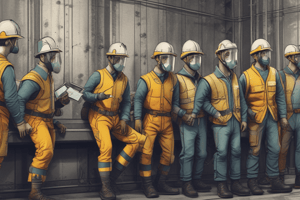Podcast
Questions and Answers
Which of the following is NOT a consideration for safety precautions taken by peace officers?
Which of the following is NOT a consideration for safety precautions taken by peace officers?
- The presence of umbrellas in the area (correct)
- Exposure to biological hazards
- Armed suspects and angry bystanders
- Environmental hazards
Peace officers are responsible for providing only basic care to victims until EMT personnel arrive.
Peace officers are responsible for providing only basic care to victims until EMT personnel arrive.
True (A)
Name one type of hazard that peace officers must consider when assessing a scene.
Name one type of hazard that peace officers must consider when assessing a scene.
Biological hazards
Peace officers must continue additional enforcement actions, including documenting their initial observations and __________.
Peace officers must continue additional enforcement actions, including documenting their initial observations and __________.
Match the safety protocols with their associated roles or descriptions.
Match the safety protocols with their associated roles or descriptions.
Which of the following items is NOT considered personal protective equipment (PPE)?
Which of the following items is NOT considered personal protective equipment (PPE)?
All PPE must be disposed of in non-approved containers regardless of contamination.
All PPE must be disposed of in non-approved containers regardless of contamination.
Name one of the methods used for the disposal of hazardous PPE.
Name one of the methods used for the disposal of hazardous PPE.
Peace officers must comply with their agency’s policies and __________ guidelines regarding hazardous waste disposal.
Peace officers must comply with their agency’s policies and __________ guidelines regarding hazardous waste disposal.
Match the following PPE items to their intended use:
Match the following PPE items to their intended use:
What should be included when performing decontamination procedures?
What should be included when performing decontamination procedures?
Prepackaged antimicrobial skin wipe towelettes are appropriate for personal hygiene in hazardous situations.
Prepackaged antimicrobial skin wipe towelettes are appropriate for personal hygiene in hazardous situations.
What type of container is used to dispose of sharp objects like needles?
What type of container is used to dispose of sharp objects like needles?
What type of gloves are recommended for single-use only?
What type of gloves are recommended for single-use only?
Leather gloves are an effective barrier to prevent contamination.
Leather gloves are an effective barrier to prevent contamination.
What must be done to reusable masks and respirators after exposure or contamination?
What must be done to reusable masks and respirators after exposure or contamination?
The recommended type of mask that filters airborne pathogens is the ___ mask.
The recommended type of mask that filters airborne pathogens is the ___ mask.
Match the PPE with its primary usage:
Match the PPE with its primary usage:
Which of the following should be done with masks and goggles after exposure to a victim's fluids?
Which of the following should be done with masks and goggles after exposure to a victim's fluids?
Face shields provide protection only from splashing at the front.
Face shields provide protection only from splashing at the front.
What must be done with disposable gowns after use?
What must be done with disposable gowns after use?
A ___ device is used during CPR to control airflow and reduce contamination.
A ___ device is used during CPR to control airflow and reduce contamination.
What should peace officer agencies provide to ensure safety during contact with victims?
What should peace officer agencies provide to ensure safety during contact with victims?
What is the recommended ratio of bleach to water for disinfecting equipment?
What is the recommended ratio of bleach to water for disinfecting equipment?
It is unnecessary to wash hands if gloves are worn during an exposure event.
It is unnecessary to wash hands if gloves are worn during an exposure event.
What action should a peace officer take if they suspect exposure to an infectious pathogen?
What action should a peace officer take if they suspect exposure to an infectious pathogen?
Peace officers should treat all body fluids as if they are __________.
Peace officers should treat all body fluids as if they are __________.
Match the following personal precautionary measures with their description:
Match the following personal precautionary measures with their description:
Which of the following is a universal precaution peace officers should take?
Which of the following is a universal precaution peace officers should take?
Using extra caution is unnecessary when handling sharp objects.
Using extra caution is unnecessary when handling sharp objects.
What should be done when handwashing is not available after exposure?
What should be done when handwashing is not available after exposure?
Staying in good __________ can help support the immune system and reduce exposure risks.
Staying in good __________ can help support the immune system and reduce exposure risks.
Which of the following practices is NOT recommended for peace officers?
Which of the following practices is NOT recommended for peace officers?
What is essential for peace officers when in direct contact with blood or bodily fluids?
What is essential for peace officers when in direct contact with blood or bodily fluids?
Pathogens can only be transmitted through direct contact with blood.
Pathogens can only be transmitted through direct contact with blood.
What are the two primary means by which pathogens can be transferred from one person to another?
What are the two primary means by which pathogens can be transferred from one person to another?
Bacteria that are considered harmful are referred to as ________.
Bacteria that are considered harmful are referred to as ________.
Match the following safety protocols with their descriptions:
Match the following safety protocols with their descriptions:
Which of the following is a method of pathogen spread?
Which of the following is a method of pathogen spread?
Viruses can reproduce outside living cells.
Viruses can reproduce outside living cells.
What must be recorded when items are moved during a medical emergency?
What must be recorded when items are moved during a medical emergency?
Airborne pathogens can be absorbed through the ________ membranes.
Airborne pathogens can be absorbed through the ________ membranes.
Which of the following represents a crucial part of decontamination procedures?
Which of the following represents a crucial part of decontamination procedures?
Flashcards are hidden until you start studying
Study Notes
Personal Protective Equipment (PPE)
- PPE includes various supplies essential for maintaining safety and hygiene.
- Examples of general supplies: soap, specialized cleaning solutions (bleach, germicide).
- Specific PPE items include antimicrobial wipes, leak-proof disposable bags, biohazard bags, and puncture-resistant containers.
PPE Disposal
- Single-use PPE, like gloves, must be disposed of per manufacturer guidelines.
- Approved disposal methods include biohazard bags, sharps containers, and liquid-proof containers.
- Officers must adhere to agency policies and OSHA standards for hazardous PPE disposal.
Decontamination Procedures
- Follow agency protocols for bloodborne pathogens during decontamination.
- Disinfect exposed equipment (e.g., vehicles, uniforms, firearms) using proper cleaning methods.
- A diluted bleach solution (1 part bleach to 10 parts water) can effectively disinfect equipment.
Universal Precautions
- Treat all body fluids as potentially contaminated.
- Wash hands with soap and warm water before and after exposure; use hand sanitizer if unavailable.
- Cover open cuts or sores with appropriate bandages for additional protection.
Personal Preventive Measures
- Officers should remain in good physical condition to support their immune systems and reduce pathogenic transmission risk.
Documentation of Exposure
- Any exposure or suspicion of exposure to infectious pathogens must be reported both verbally and in writing promptly.
Standard PPE Access
- Protective gloves (vinyl, latex, synthetic) should be single-use, changed between victims, and discarded correctly.
- Eye protection options include protective glasses, goggles, and face shields to prevent exposure to bodily fluids.
- Masks like surgical types, particulate masks, and N-95 respirators filter airborne pathogens and should be cleaned or disposed of post-use.
- Disposable gowns protect clothing from spilled fluids and are meant for single use.
- Ventilation devices, such as portable pocket masks, are used during CPR to prevent contamination.
Pathogen Knowledge
- Infection is caused by pathogens, spread through air or contact with contaminated materials.
- Bacteria can be beneficial or harmful; harmful bacteria are considered pathogens.
- Viruses infect living cells and can reproduce within the host.
Means of Pathogen Transfer
- Pathogens transfer mainly through airborne means (coughing, sneezing) or contact with bodily fluids.
- officers must assess risks such as biological hazards, armed suspects, unsafe scene conditions, and environmental hazards.
Peace Officer Responsibilities
- Officers may need to provide initial emergency medical care before transferring to EMS personnel.
- Responsibilities include documenting the initial scene assessment, maintaining control to protect evidence, isolating witnesses, and recording victim and witness statements.
Studying That Suits You
Use AI to generate personalized quizzes and flashcards to suit your learning preferences.




